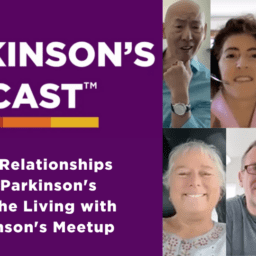In this Live Well Today webinar recording, Director of Education and Content Devon Fulford talks with Lisa Thomas and Daniel Fleshner, two Colorado-based certified sex therapists, about intimacy and Parkinson’s.
During this interview, Lisa and Daniel discuss what a healthy sex life can look like while living with Parkinson’s, the importance of flexibility, and acknowledgement of new circumstances, changes in attraction, and much more!
The notes below highlight and expand upon some of the core messages from the webinar discussion, and you can watch or listen to the complete recording using the links that follow this paragraph. You can also subscribe to our YouTube page and be updated automatically about all our videos as soon as they are uploaded.
An audio version of this webinar is available.
SHOW NOTES
CANDID CONVERSATION
Early in this webinar, Daniel observes that every person’s health situation is different and that a healthy sex life looks different for each person and each partnership. This is especially true for people living with Parkinson’s, because Parkinson’s can affect your ability to be physically intimate in multiple ways.
For example, you might have difficulty turning over or being in a position you used to be in during sex, you might have disruptive dystonia or dyskinesia, or you might just have more pain than before. Considering these and other impacts of Parkinson’s on physical intimacy, Daniel recommends having candid conversation about what your sex life can look like, given your circumstances.
If candid conversation is not feasible without help, you may benefit from connecting with a certified sex therapist. The American Association of Sexuality Educators, Counselors, and Therapists website can help you find one. Psychology Today’s therapist finder can also help.
RITUALS OF CONNECTION
Regardless of your individual circumstances, Daniel also recommends establishing rituals of connection to help strengthen your relationship. Rituals of connection can be just about anything: drinking tea together in the morning, a Sunday afternoon drive, or a set time you and your partner simply cuddle.
When thinking about your rituals with your partner, consider what drew you together, what you like about each other, and your mutual interests. Establishing rituals of connection that involve shared interests can help make the ritual remain a regular part of your relationship.
BE FLEXIBLE AND DO WHAT FEELS GOOD
In most relationships there are patterns: Someone tends to take the trash out, someone does the dishes, and someone keeps the social calendar up to date. Most sexual and intimate relationships also have patterns. Perhaps one partner tends to initiate physical intimacy more than the other, or perhaps one partner tends to be more likely to spark important conversations.
When living with Parkinson’s, these patterns may become less stable, so you might need to be more flexible–including who takes the role of the initiator in sexual or intimate connections.
You also may need to adjust expectations around what type of intimate interactions are possible. Taking the pressure off of having intercourse or an orgasm, and instead focusing on doing things that simply feel good with your partner can be helpful in ensuring intimacy feels accessible.
MEDICATION INTERSECTIONS: ATTEND DOCTOR VISITS TOGETHER
Some Parkinson’s medications influence intimacy.
One of the more common ways this happens is that as Parkinson’s progresses, it is likely to become more important to time your sexual interactions—or even physical intimacy like massage or holding hands—around times of peak medication efficacy.
Another common impact of Parkinson’s medication on physical intimacy is that impulse control disorders are a possible side effect of dopamine agonists.
Also, some anti-depressants contribute to a blunted sexual response and impact arousal or ability to orgasm.
Because of the nuances of these effects, you and your partner might consider attending doctor’s visits together. Not only can this help you track all the shared information, it helps ensure you don’t forget to provide information to your care team in response to questions they may ask.
LOSS OR CHALLENGES RELATED TO ATTRACTION
It is not uncommon for one or both partners—even in relationships uninfluenced by Parkinson’s—to experience changes in how sexual attracted they are to their partner. Parkinson’s can contribute to changes in sexual attraction to your partner in multiple ways.
The most important way to respond to this is to start by acknowledging that these changes are no one’s fault. Living with Parkinson’s, you likely know better than most that everything is subject to change, but this doesn’t make navigating changes in attraction any less challenging. If you or your partner are not comfortable navigating this without help, you might benefit from talking with a sex therapist together.
OTHER TIPS AND ADVICE ABOUT INTIMACY AND PARKINSON’S
- Maintaining intimacy is an ongoing process–not something you do once and are done. What works for you when you are 20 is likely to be different from what works for you 40, 60, or 80. Find enjoyable ways to navigate the changes with your partner. Make a standing date two or three times each year (or as often as you think appropriate) to discuss intimacy in your relationship.
- Viagra has been researched for use by people with Parkinson’s and is generally considered safe. Be sure your movement disorder specialist knows if you start taking it.
- Penile implants may also help with erectile dysfunction. Talk with your movement disorder specialist to see if this may be a better option than pharmaceutical intervention.
- Try to be curious and open to the idea of toys, lubrication, and other aids like bolsters and strategically placed pillows to help make sexual intimacy safer and more enjoyable.
CONCLUSION: THERE IS NO CAP ON SEXUAL INTIMACY
During this webinar, Lisa says, “There is no age limited on sex and intimacy. People are intimate and sexual throughout their lifespan. There is no age limit and no condition that puts a cap on having desire, wanting closeness, and wanting that connection with your partner.”
Remember: It takes a team to live well with Parkinson’s. You, your partner, your neurologist, and your therapist can work together to help you have rich and meaningful connections throughout your life. With focus, courage, and caring conversation, you can have satisfying and physically intimate relationships while living with Parkinson’s.
ADDITIONAL RESOURCES
The Role of Sex Therapy in the Management of Patients with Parkinson’s
Sexual Dysfunctions in Parkinson’s and Their Influence on Partnership
Sex Disorders and Quality of Life in Parkinson’s
Anti-depressants: Which Cause the Fewest Sexual Side Effects
Speaker Bios

Lisa Thomas, LCSW, LMFT, DAACS
Lisa Thomas is a licensed social worker, marriage and family therapist, and an AASECT certified sex therapist and supervisor.
Lisa has been in private practice for nearly 25 years in Denver and specializes in helping people build satisfying sexual relationships through chronic illness, pain, and aging. She also supervises clinicians working towards their sex therapy certification. Lisa is passionate about teaching everyone about the healing and connecting powers of a good emotional and physical relationship.
Lisa often speaks to medical associations on sexuality and relationships and has trained numerous healthcare professionals over the years on sexual health and relationships, believing a supportive and satisfying partnership can be a key to dealing with health challenges. Communication, education, and flexibility are vital to success.
Lisa is married with two children, one of whom just left for college, and in her free time, enjoys skiing, hiking and concerts.
Daniel Fleshner, LPC, NCC, AASECT Certified Sex Therapist

Daniel Fleshner is a licensed professional counselor, certified sex therapist, and the founder of Inflection Point Therapy in Denver, Colorado. He has a passion for helping people identify what they want their sex lives to look like and giving them the tools to make it happen. He decided to become a therapist out of a desire to offer people a place to tell their stories and feel supported as they work to become the best versions of themselves. Outside of work, he loves being in nature and spending time with his dog.











